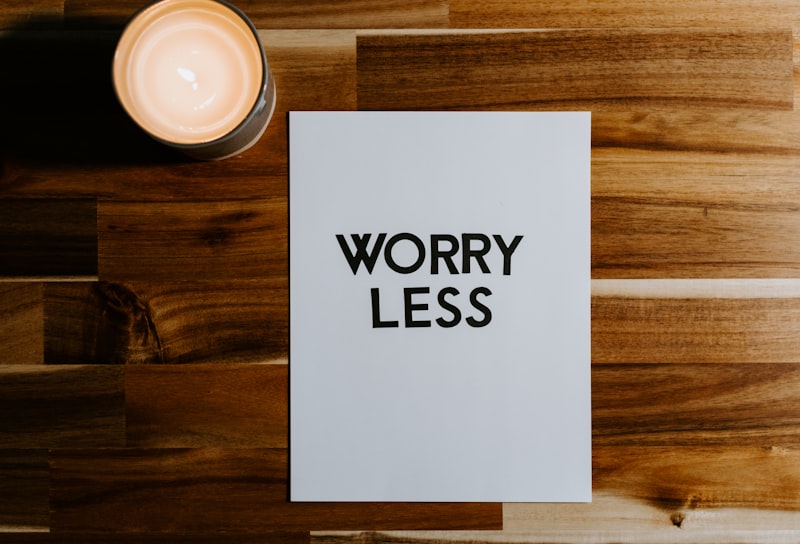Feeling overwhelmed by anxiety is a common experience, but mindfulness offers a powerful tool to regain control and find inner peace. Imagine anxiety as a turbulent ocean; mindfulness acts as your anchor, steadying you amidst the waves. By focusing on the present moment, you cultivate awareness without judgment, allowing anxious thoughts to pass like clouds in the sky.
Mindfulness practices vary, but they often involve simple yet profound techniques. One effective method is mindful breathing. Close your eyes, take a deep breath in, and exhale slowly, feeling the sensation of each breath filling your lungs. This exercise not only calms the mind but also anchors you firmly in the present.

Another helpful practice is body scan meditation. Lie down comfortably and bring attention to different parts of your body, starting from your toes up to the top of your head. Notice any tension or discomfort without trying to change it. This awareness helps release physical stress and promotes relaxation.
Mindfulness isn’t just about meditation; it’s a way of life. Incorporating mindful moments into your daily routine—like savoring a cup of tea or fully engaging in a conversation—can significantly reduce anxiety levels over time. These small acts of mindfulness train your mind to focus on what’s happening now rather than worrying about the future or dwelling on the past.
Research supports mindfulness as an effective strategy for managing anxiety. Studies show that regular practice can lower cortisol levels, decrease symptoms of anxiety disorders, and improve overall mental well-being. The beauty of mindfulness lies in its accessibility; anyone can practice it anywhere, anytime, with no special equipment needed.
In essence, managing anxiety through mindfulness involves embracing the present moment with open arms. It’s about nurturing a gentle curiosity towards your thoughts and emotions, fostering a sense of calm amidst life’s uncertainties. By cultivating mindfulness, you empower yourself to navigate anxiety’s challenges with grace and resilience.
Mastering Peace: How Mindfulness Can Calm Anxiety
So, what exactly is mindfulness? At its core, mindfulness is about being present in the moment without judgment. It involves paying attention to the sensations, thoughts, and emotions that arise, observing them with acceptance and kindness. In essence, it’s about tuning into the present rather than getting caught up in worries about the future or regrets about the past.
Imagine your mind is a clear sky and thoughts and feelings are clouds passing by. Mindfulness teaches you to observe these clouds without being swept away by them. This simple yet profound shift in perspective can significantly reduce the grip of anxiety. Instead of being consumed by anxious thoughts, mindfulness allows you to step back and see them for what they are: passing mental events.

Numerous studies have highlighted the benefits of mindfulness for anxiety. By regularly practicing mindfulness meditation, individuals can rewire their brains, enhancing the prefrontal cortex’s ability to regulate emotions and reducing the reactivity of the amygdala, the brain’s fear center. This means that over time, practitioners become less prone to stress and anxiety triggers, and more capable of responding calmly to challenging situations.
Moreover, mindfulness isn’t just about sitting quietly and meditating. It can be woven into everyday life. Whether you’re eating, walking, or even washing dishes, you can practice mindfulness by bringing your full attention to the activity at hand. This fosters a sense of presence and engagement with the present moment, reducing the space for anxious thoughts to take hold.
The Science Behind Mindfulness: A Powerful Tool for Anxiety Management
Have you ever felt overwhelmed by anxiety, wishing for a way to calm your mind and find inner peace? The science of mindfulness offers a powerful solution. Mindfulness isn’t just a passing trend; it’s a scientifically-backed technique that has gained recognition for its profound impact on anxiety management.
At its core, mindfulness is about being present in the moment, fully aware of your thoughts, feelings, and sensations without judgment. It’s like training your mind to focus on the here and now, rather than getting lost in worries about the past or future. This practice, rooted in ancient meditation traditions, has been extensively studied in modern psychology for its therapeutic benefits.
Research has shown that regular mindfulness practice can significantly reduce symptoms of anxiety. By fostering a non-reactive awareness of one’s thoughts and emotions, mindfulness helps individuals break free from the cycle of worry and rumination. It teaches us to observe our anxious thoughts without getting caught up in them, ultimately leading to a sense of calm and clarity.
One of the key mechanisms behind mindfulness is its effect on the brain. Neuroimaging studies have revealed that mindfulness meditation can alter the structure and function of the brain regions involved in emotion regulation and stress response. It strengthens the prefrontal cortex, responsible for rational decision-making, while dampening the activity of the amygdala, the brain’s fear center.
Imagine mindfulness as a mental gym workout. With practice, you build resilience and flexibility in your mind, better equipped to handle stressful situations with grace and composure. It’s not about eliminating anxiety altogether but rather developing a healthier relationship with it.
Incorporating mindfulness into your daily routine doesn’t require hours of meditation. Even a few minutes of mindful breathing or body scan exercises can make a significant difference. The key is consistency and intentionality in practicing present-moment awareness.
As you embark on your mindfulness journey, consider its broader implications beyond anxiety management. Many practitioners report enhanced overall well-being, improved focus, better sleep, and even stronger relationships. It’s a holistic approach to mental health that empowers individuals to live more fully in each moment.
Ready to discover the transformative power of mindfulness for yourself? Start with simple practices today and observe how your relationship with anxiety begins to shift. Embrace the science behind mindfulness and embark on a path to greater inner peace and resilience.
Mind Over Matter: Using Mindfulness to Combat Anxiety

Imagine anxiety as a turbulent ocean, with waves of worry crashing relentlessly. Now, picture mindfulness as a sturdy boat that allows you to navigate these waters with calmness and clarity. By focusing on the present moment, mindfulness helps to anchor your thoughts away from anxious projections about the future or dwelling on past regrets.
The beauty of mindfulness lies in its simplicity. It doesn’t require elaborate techniques or hours of practice. It starts with something as basic as paying attention to your breath. Close your eyes for a moment and notice how your breath moves in and out of your body. As you do this, you become attuned to the sensations of each inhale and exhale, grounding yourself firmly in the here and now.

Another powerful aspect of mindfulness is its ability to foster a non-judgmental attitude towards your thoughts and emotions. When anxiety creeps in, instead of fighting it or allowing it to overwhelm you, mindfulness encourages you to observe it with curiosity. You might ask yourself, “What is this anxiety trying to tell me? What sensations do I feel in my body right now?”
Through regular practice, mindfulness rewires your brain, strengthening the neural pathways associated with calmness and resilience. It teaches you to respond to challenges with clarity rather than react impulsively out of fear. This shift from reactivity to responsiveness can be transformative in managing anxiety effectively.
Daily Mindfulness Habits That Transform Anxiety Into Calm
Do you often find yourself overwhelmed by anxiety? Transforming anxious moments into calm can be achieved through simple yet powerful daily mindfulness habits. Mindfulness involves being fully present in the moment, focusing your awareness on the here and now without judgment. By incorporating these practices into your daily routine, you can effectively manage anxiety and cultivate a sense of inner peace.
One of the most effective mindfulness habits is deep breathing. Taking slow, deep breaths can instantly calm your nervous system, reducing feelings of anxiety. Practice deep breathing exercises for a few minutes each day, inhaling deeply through your nose, holding for a moment, and exhaling slowly through your mouth.
Another powerful habit is mindful observation. Take time each day to observe your thoughts and feelings without getting caught up in them. Imagine your thoughts as passing clouds in the sky, allowing them to come and go without attachment. This practice helps you develop a non-reactive awareness of your inner experiences.
Engaging in daily gratitude is also transformative. Take a moment each morning or evening to reflect on things you’re grateful for. This simple practice shifts your focus from worry to appreciation, promoting a positive mindset and reducing anxiety levels.
Physical activity infused with mindfulness, such as yoga or walking meditation, can also be incredibly beneficial. These practices not only enhance physical health but also cultivate mental clarity and relaxation. Focus on the sensations of movement and breathing during these activities to anchor yourself in the present moment.
Lastly, prioritize self-care rituals that nourish your mind and body. Whether it’s taking a warm bath, listening to soothing music, or enjoying a cup of tea, these moments of relaxation are essential for reducing stress and promoting calmness.
Incorporating these daily mindfulness habits into your routine takes practice and consistency. Over time, you’ll notice a significant reduction in anxiety levels and an increase in overall well-being. Embrace mindfulness as a daily ritual, and watch how it transforms your anxious moments into moments of peace and clarity.
Mindfulness Meditation: Your Key to Overcoming Anxiety
In its essence, mindfulness meditation encourages you to focus on the present moment without judgment. It’s about observing your thoughts and sensations as they arise, acknowledging them, and then letting them pass without getting caught up in them. This practice trains your mind to stay calm and centered, even in the face of anxiety-inducing thoughts.
Picture yourself sitting comfortably, eyes closed, and taking slow, deep breaths. With each inhale and exhale, you consciously release tension and worry. This deliberate act of breathing becomes a ritual, a pause button for the mind’s frantic thoughts. Gradually, you begin to notice a subtle shift – a sense of peace washing over you.
Researchers have found that regular mindfulness practice can rewire the brain, enhancing areas responsible for emotional regulation and reducing the amygdala’s reactivity to stress. It’s like strengthening a muscle; the more you practice, the more resilient your mind becomes.
Now, consider anxiety as a dark cloud looming overhead. Mindfulness meditation doesn’t make the cloud disappear, but it teaches you to observe it from a distance, understanding that clouds pass and the sun eventually shines through. It’s a journey of self-discovery and empowerment, where each session brings you closer to mastering your mind.
In today’s fast-paced world, where stressors abound and uncertainty lingers, mindfulness meditation offers a sanctuary – a quiet space within yourself where you can retreat anytime. It’s not a quick fix but a lifelong skill that equips you to navigate life’s challenges with grace and resilience.
From Stress to Serenity: Mindfulness Techniques That Work
Mindfulness isn’t just a trendy buzzword—it’s a powerful practice that can transform how we experience daily life. In today’s fast-paced world, stress seems inevitable, but with mindfulness techniques, you can shift from chaos to calm, finding serenity amidst the hustle.
One of the simplest yet effective mindfulness practices is focused breathing. By tuning into your breath, noticing its rhythm, and feeling it move through your body, you anchor yourself in the present moment. This technique not only reduces stress but also enhances clarity and focus.
Another technique gaining popularity is body scan meditation. It involves systematically focusing on each part of your body, from head to toe, observing sensations without judgment. This practice promotes relaxation and awareness of bodily tensions that may contribute to stress.
Mindfulness also extends to everyday activities. Mindful eating, for instance, encourages you to savor each bite, appreciating flavors and textures. By slowing down and being fully present during meals, you cultivate a deeper connection with food and enhance digestion.

For those constantly on the go, mindful walking offers a refreshing break. Paying attention to each step, feeling the ground beneath your feet, and observing your surroundings can bring a sense of peace and rejuvenation, even in urban environments.
Mindfulness isn’t about eliminating stress altogether but rather about changing your relationship to it. By practicing these techniques regularly, you develop resilience and a greater capacity to navigate challenges with composure.
Incorporating mindfulness into your daily routine doesn’t require hours of meditation. Even a few minutes of mindful breathing or a brief body scan can make a noticeable difference in your overall well-being. The key lies in consistency and gentle persistence.
As you explore mindfulness techniques, remember that it’s a journey of self-discovery and self-care. Each moment presents an opportunity to choose presence over distraction, cultivating inner peace and resilience in the face of life’s demands.
Mindfulness Apps: The Modern Solution to Anxiety Relief
In today’s fast-paced world, anxiety has become a prevalent issue affecting many individuals. Fortunately, technology offers a modern solution in the form of mindfulness apps. These apps have gained significant popularity for their ability to provide accessible and effective anxiety relief.
Imagine having a personal guide in your pocket, ready to help you manage stress anytime, anywhere. That’s exactly what mindfulness apps offer. They are designed to introduce users to mindfulness practices through guided meditation sessions, breathing exercises, and calming techniques. By incorporating these practices into daily routines, users can experience reduced anxiety levels and improved overall well-being.
One of the key benefits of mindfulness apps is their user-friendly nature. Whether you’re new to mindfulness or a seasoned practitioner, these apps cater to all levels. They feature intuitive interfaces and a variety of programs tailored to specific needs, such as stress reduction, better sleep, or emotional resilience. This customization ensures that each user can find a program that suits their personal journey towards anxiety relief.
Moreover, mindfulness apps foster a sense of community and support. Many offer features like progress tracking, reminders for practice sessions, and even forums to connect with like-minded individuals. This sense of community can be particularly reassuring for those struggling with anxiety, as it provides a virtual support network right at their fingertips.
In essence, mindfulness apps represent a modern approach to tackling anxiety, leveraging technology to promote mental well-being. By combining convenience, effectiveness, and community support, these apps empower users to take charge of their mental health in a proactive and sustainable way. Whether used daily or during moments of heightened stress, they serve as powerful tools for achieving greater calm and resilience in today’s hectic world.
Frequently Asked Questions
What are the benefits of practicing mindfulness for anxiety relief?
Discover how mindfulness can help alleviate anxiety through focused attention techniques that promote relaxation, reduce stress hormones, and enhance emotional regulation.
How can I start practicing mindfulness to reduce anxiety?
Learn how to practice mindfulness to reduce anxiety with simple techniques like focused breathing, body scans, and mindful awareness of thoughts and sensations. Start by setting aside a few minutes daily in a quiet space to cultivate mindfulness, gradually increasing duration as you feel more comfortable.
What is mindfulness and how does it help manage anxiety?
Learn what mindfulness is and how it aids in anxiety management. Discover practical techniques to cultivate mindfulness and its impact on reducing stress and promoting emotional well-being.
Can mindfulness techniques be combined with other therapies for anxiety?
Yes, mindfulness techniques can complement other therapies for anxiety by promoting awareness of thoughts and emotions, reducing stress levels, and enhancing overall well-being. Combining mindfulness with therapies like cognitive-behavioral therapy (CBT) or medication can offer a more holistic approach to managing anxiety.
What are some simple mindfulness exercises I can do daily for anxiety?
Discover effective mindfulness exercises to manage daily anxiety. Learn simple techniques like deep breathing, body scan meditation, and mindful walking. Practice regularly to cultivate calmness and reduce stress.


